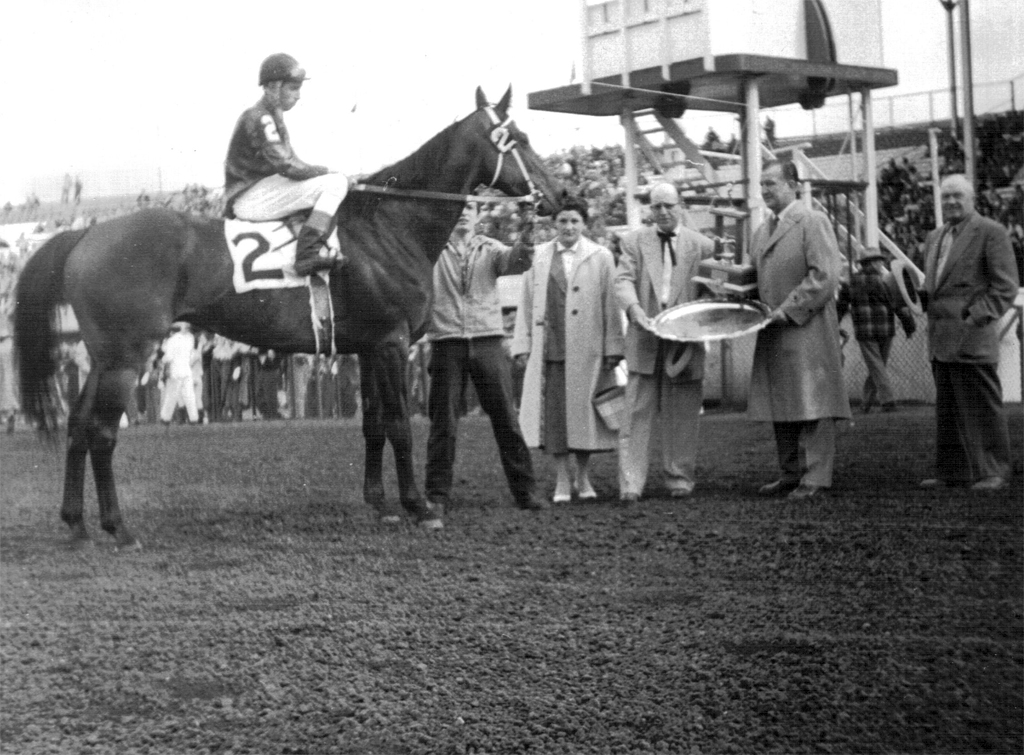
Light Dust wins Tweeworth Plate on June 15, 1957. Trainer Bob Watt accepts trophy platter for his favourite horse.
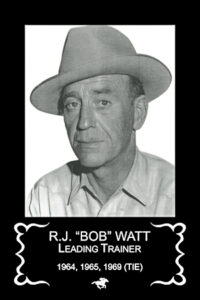 by Bob Gates
by Bob Gates
On the evening of Friday August 30, 1946, old Polo Park looked more like Satan’s Hell than it did a racetrack. The scene was chaotic. Flames leveled “B” barn in less then 30 minutes at the westend oval.
Bob “Boo Boo” Watt had only been training for a year when he and a half-dozen others stepped-up and tried to save the lives of 35 frenzied thoroughbreds that were trapped in the raging inferno that was “B” barn.
There was no time for thinking, only action. The courageous horsemen freed the horses so they could escape the fiery death trap. The rounding up of loose horses would be dealt with later.
It was pure bedlam. Horses were running down Portage Avenue and the surrounding side streets. Two horses perished in the blaze but were it not for the spontaneous actions of Bob and his group, the loss of life would have been much greater.
But our story of Robert J. Watt starts much earlier. Bob was born in 1915, just a stone’s throw from where Polo Park would be built in 1925, so it was only natural that he would cut his teeth on horse racing at Polo Park.
At the age of 16, Watt started walking hots and rubbing thoroughbreds and in the mid 1940s he graduated to the ranks of trainer, a vocation he would spend the rest of his life perfecting.
He was already doing well in the racing game when he got his big break in 1949, taking the reins of the local Meadowbrook Stable of Max Freed and Frank Kilroy. He remained under the employ of Freed for the next 15 years, with his time split between Meadowbrook and later Freed’s solo operation of Maxwell King Stables.
As Meadowbrook’s trainer, Watt conditioned some of the finest horses in western Canada including Fort Garry, Victory Gift, Free as Air and Dandy Thought, but the best of them all was Light Dust, a gelded son of Fairmond that was also Watt’s favourite. I can’t go any further without a few words about this boy.
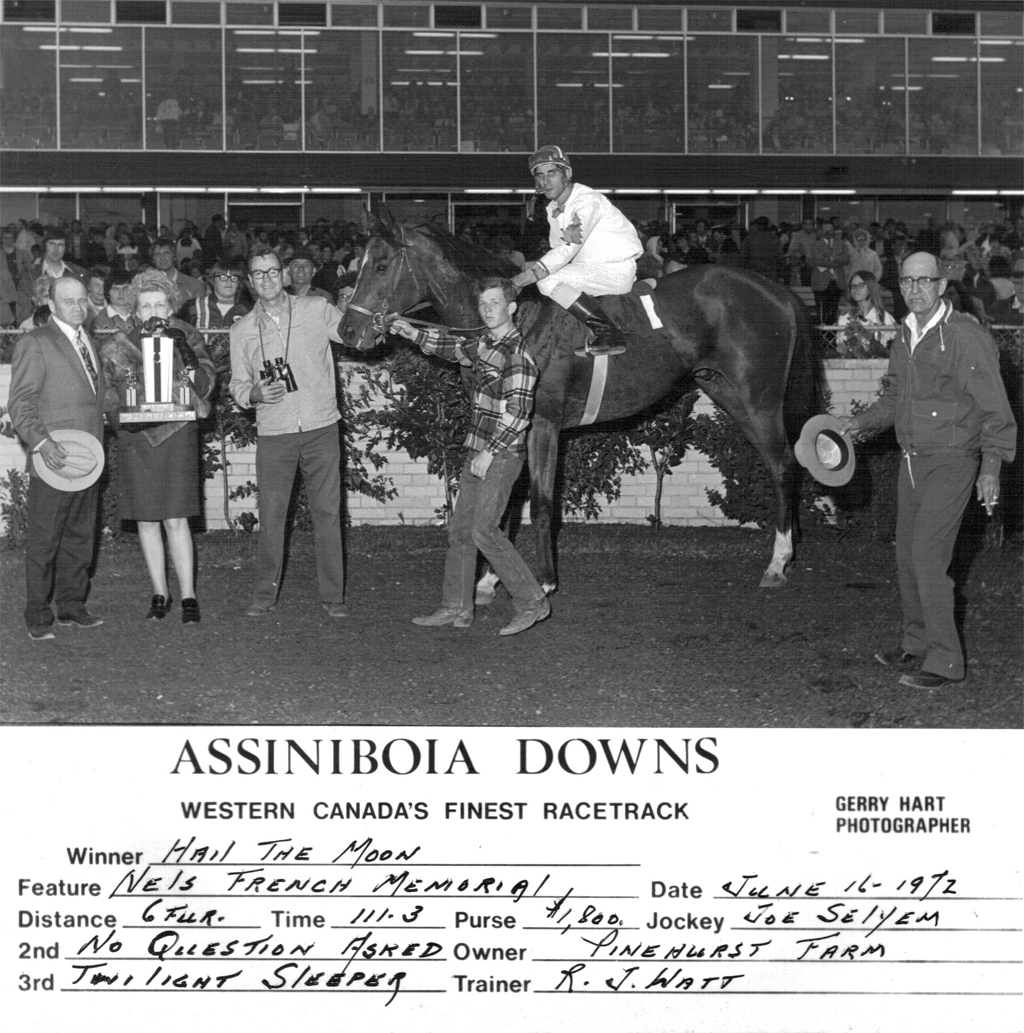
Hail The Moon wins Nels French Memorial for trainer Bob Watt on June 16, 1972.
Light Dust won the prestigious Western Canada Handicap in 1954, 56 and 57. In 1955 he ran third in the race. Light Dust’s best years were 1956 and 57 when he won 15 races and just over $25,000, which would be over $230,000 in today’s dollars! In 1963, the once mighty steed was still running at the Downs albeit for a $1,000 claiming tag. At the age of 13, he was a good, honest runner, but sadly a mere shadow of his former self.
In 1964 Watt and Freed parted company with Watt taking on track vet Dr. Norm Anderson’s Pinehurst Farms operation. Pinehurst was located in horse country, otherwise known as Oakbank, just down the road from John Sifton’s Stoneacres Farm.
Watt conditioned the largest stable at the Downs in the mid 1960s and in addition to Pinehurst, he also conditioned horses for Lew Miles, Harry Crane, Arthur Liffmann and former WHA Winnipeg Jet owner, Benny Hatskin.
Awards/Achievements:
• Downs leading trainer in 1964 (22 wins) and 1965 (29 wins). In 1969 (22 wins) finished in a tie with current all-time leading trainer, Gary Danelson.
• In 1966 became the Downs all time leading trainer with 82 wins. June 1967 saddled his 100th winner. His 200th winner came in July 1972 and 250th in August 1976. All were firsts for Assiniboia Downs and all races were won at the Downs. Retained the title of Downs’ all time leading trainer until Clayton Gray took over in 1978.
• To commemorate the Downs 24th anniversary in 1982, Watt was one of eight special guests invited to participate in the celebration. All of the guests were present when the track was opened in June 1958.
• In 1986 Watt was one of six people named honorary stewards of the Manitoba Horse Racing Commission in recognition of their contributions to the sport.
Downs Patriarch, the late Albert “Bert” Blake singled out Watt as a colleague he respected saying that the “Soft Shoe” (known for his dancing ability) was a man of great moral character.
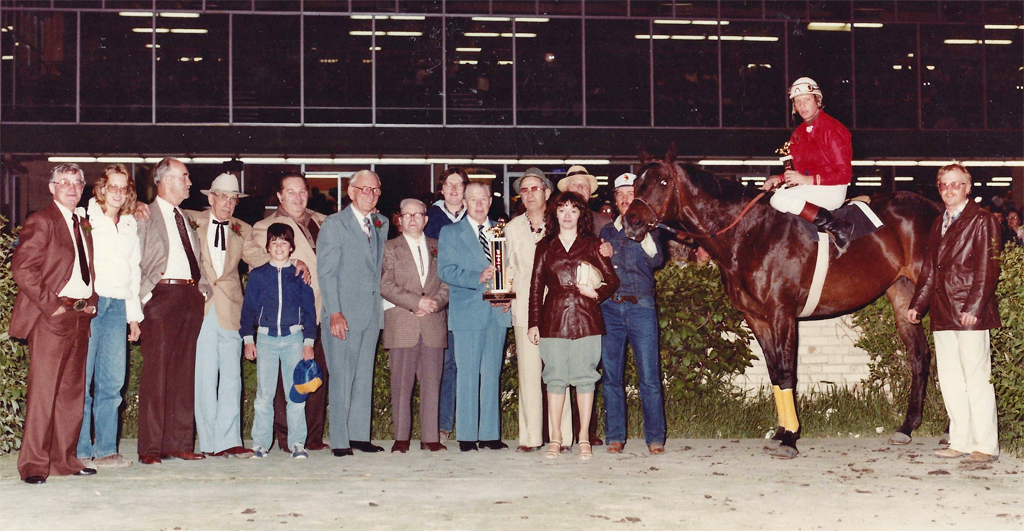
Astral Moon June 11, 1982. 24th Anniversary Purse (Bob Watt, Steve Juba, Scotty Kennedy)
What others had to say about Watt:
One of the real old-time horsemen – a real character with lots of stories.
The best at bringing cocky youngsters back to earth without being mean, giving them very subtle reality checks.
Our beloved bootlegger on the race track. He had so many good-old-days stories.
Good trainer, good to his crew and more of a softy than his manner would suggest.
Very good horseman, especially with the young ones, he knew how to bring them along.
Try as I might, I was never able to find out how he got the nickname “Boo Boo” but I was told it came to him compliments of starter, Nick Cizik and jockey, Tommy Stadnyk in the early days of the Downs. Most people I spoke with agreed, he was always known as Boo Boo.
Watt was around the racetrack in seven different decades, five of them as a trainer. I really don’t think it’s possible to sum up his story in a 1,000-word blog and do it justice. I know I couldn’t do it. I haven’t even scratched the surface of the old-time horseman’s long career and life.
Watt’s bride, Louise, or “Mother” as she was known to all, was a fixture on the prairie horse racing circuit dating back to the 1940s, and the couple’s tack room cocktail hour arguments were the stuff from which legends are made. Louise passed in 1978 and her husband retired in 1981, but he continued to drop by the track kitchen for several years for his daily dose of caffeine and track chat. Watt just couldn’t stay away.
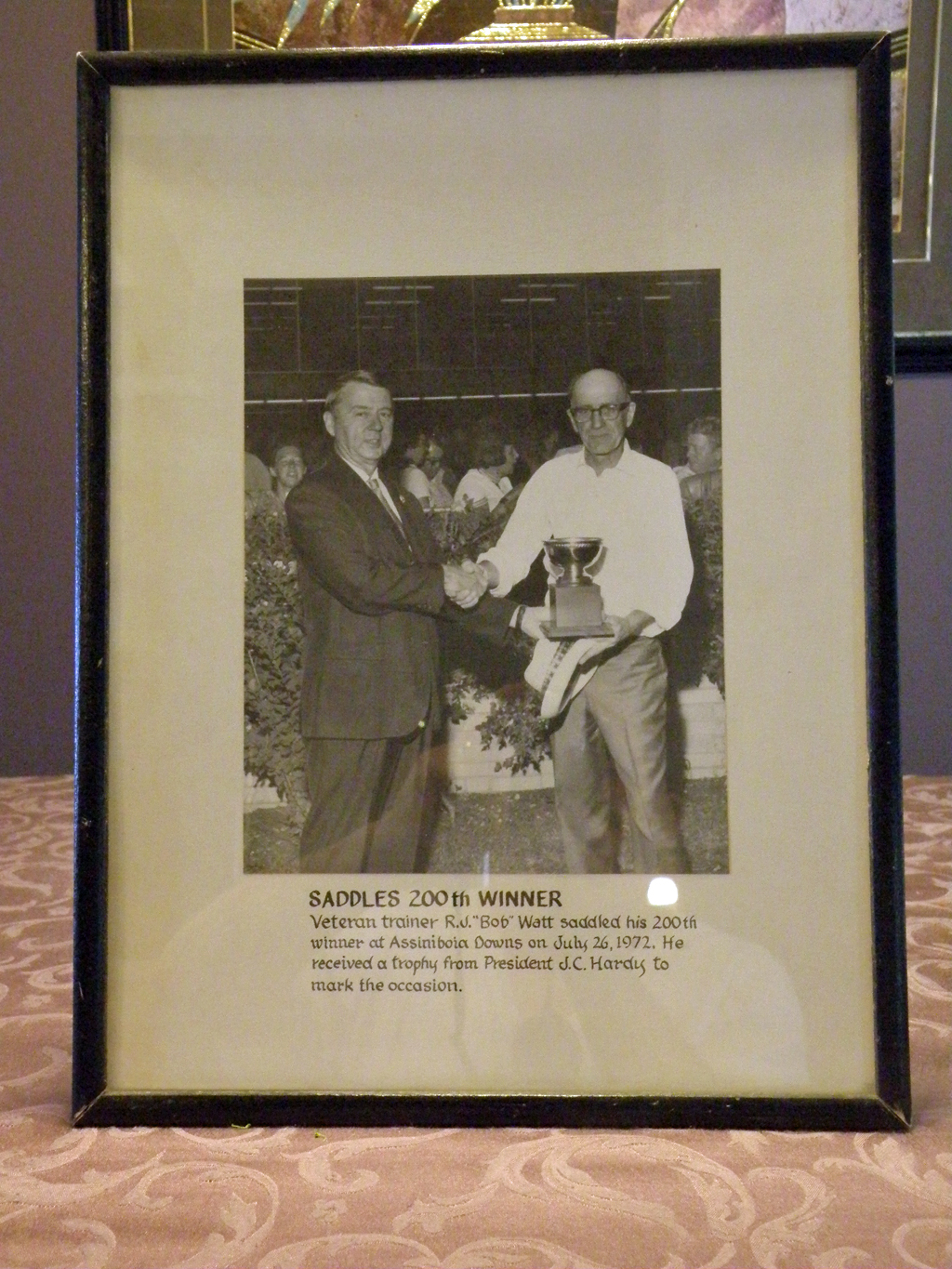
Bob Watt saddles 200th winner at ASD.
In 1999 Watt’s health was failing. The race meeting at the Downs opened on May 9 and he just made it to another season of local racing. Two days later his old friend, Light Dust whispered to him. There were horses that needed him. It was time.
And Boo Boo was gone.
